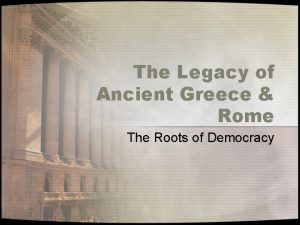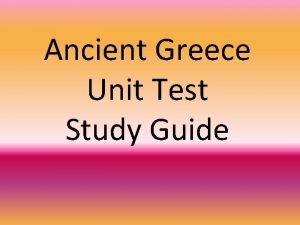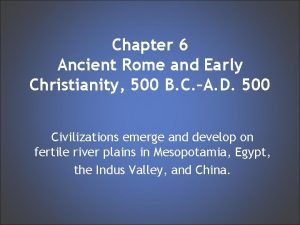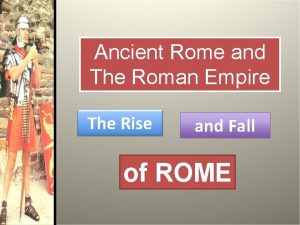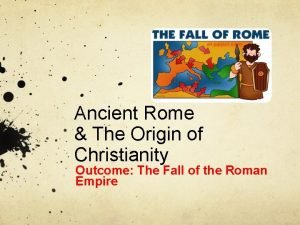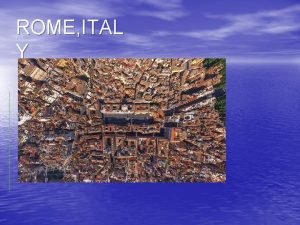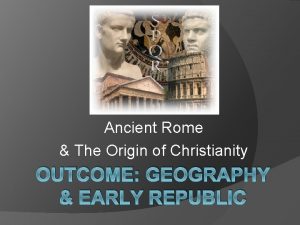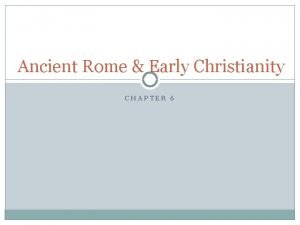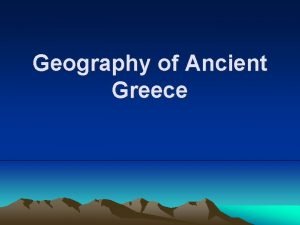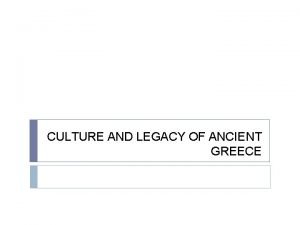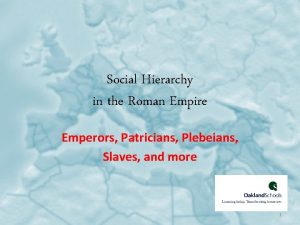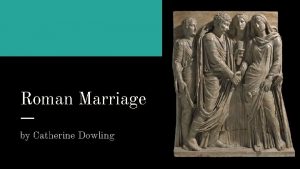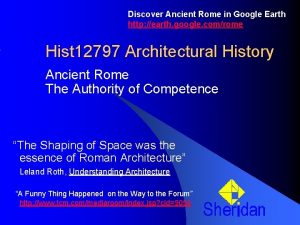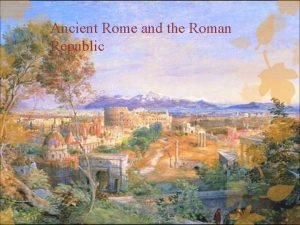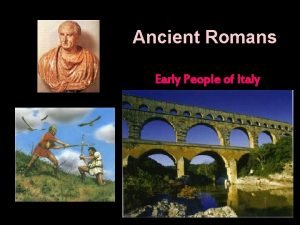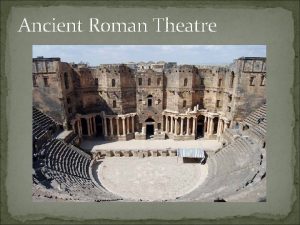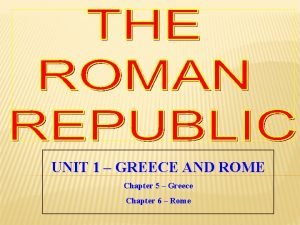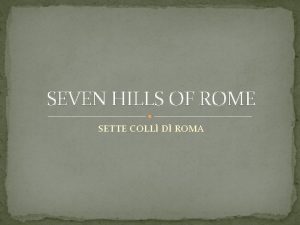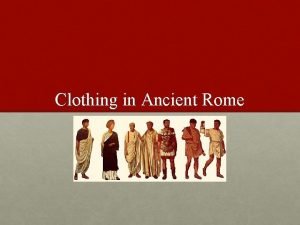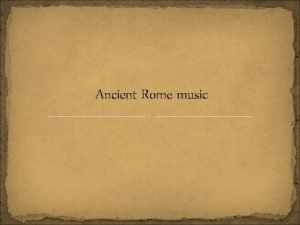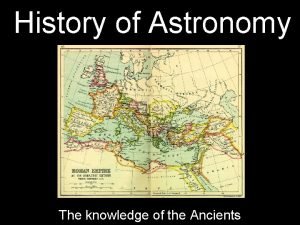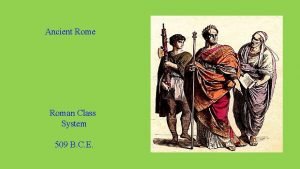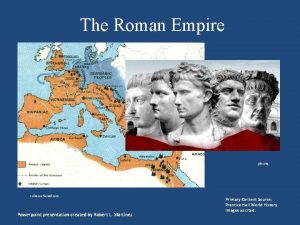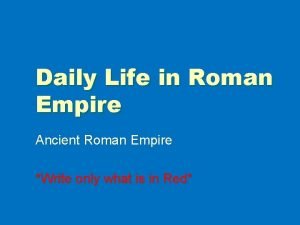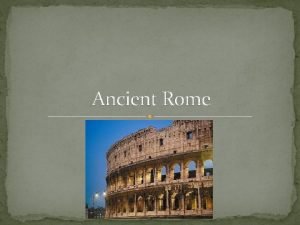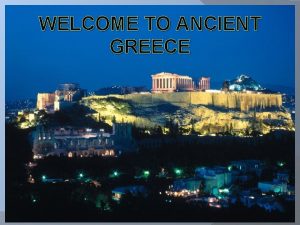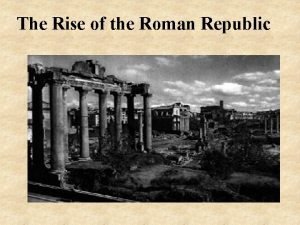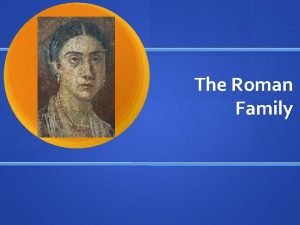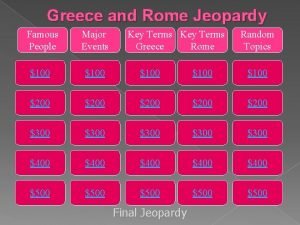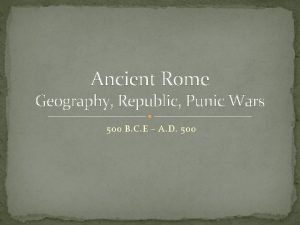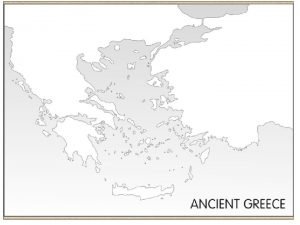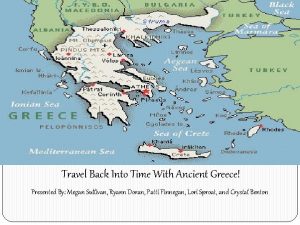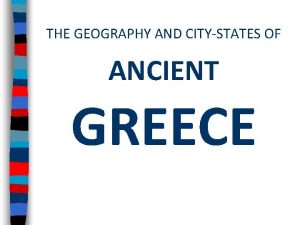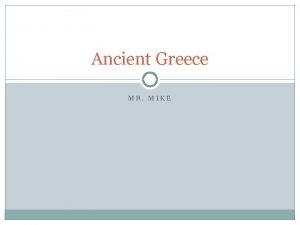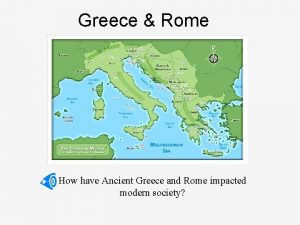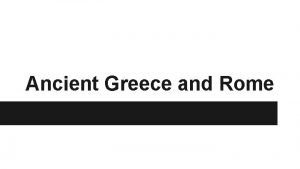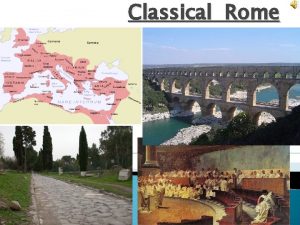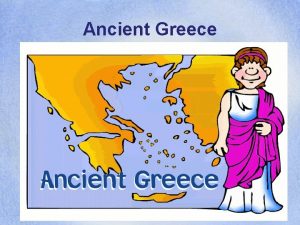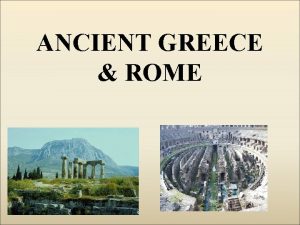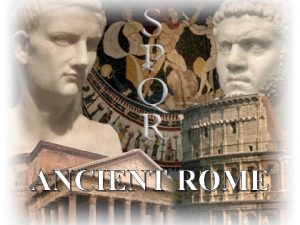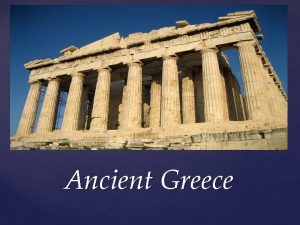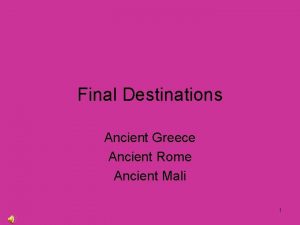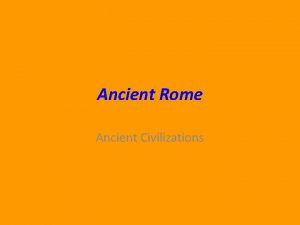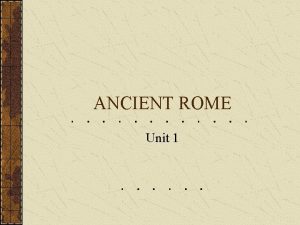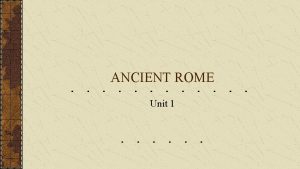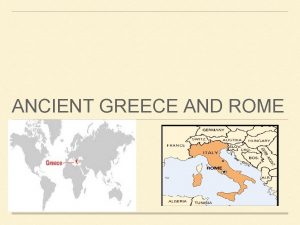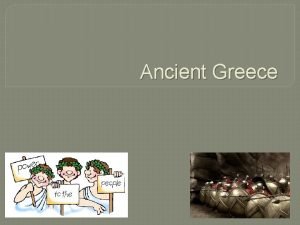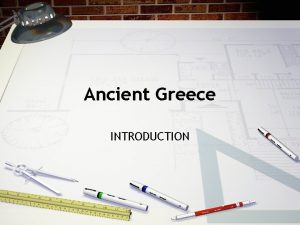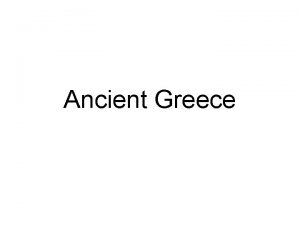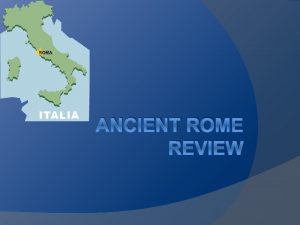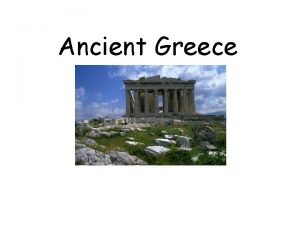Unit 3 Ancient Greece and Rome Greece Rome









































- Slides: 41

Unit 3: Ancient Greece and Rome -Greece -Rome -Rise of Christianity -Byzantine Empire

Bell Ringer 9/23 If you could be any Greek god/goddess who would you be and why?


Ancient Greece, 1750 BCE-133 BCE • Minoan civilization (island of Crete in the Aegean Sea) influenced by Egypt & Mesopotamia • Early civilization of Greece, 1750 BCE-1500 BCE • Traded throughout the Aegean Sea • Rulers lived at Palace of Knossos • Frescoes: _______________ ___ • Vanished 1400 BCE volcanic eruption, earthquake followed by tidal


Mycenae, 1400 BCE-1200 BCE • People were sea traders—Aegean, Italy, Sicily, Egypt, and Mesopotamia • Lived in city-states ruled by warrior-kings • Trojan War (1250 BCE) • Mycenae vs Troy (fighting over straights/ romantic legend)

Age of Homer • After fall of Mycenaean civilization (attack by sea raiders), Dorians invaded Aegean • 1100 BCE-800 BCE—a period that declined • Homer tells of this period in the Iliad and the Odyssey • Blind poet that influenced European writers & artists for 3, 000 years

Greek City-States • Balkan Peninsula contains mountains & valleys • No large empires; isolated city-states that guarded their independence • Bays = harbors for ships • Skilled sailors spreading _____ & _____

City-States (cont) • Polis-version of city-state built on two levels • Acropolis on hilltop & walled city below • Government • 1 st form = monarchy; 2 nd form= noble landowners (aristocracy: _____________); 3 rd form=oligarchy (______________) • Military technology advanced • Iron weapons 650 BCE • Phalanx- formation of armed soldiers • Reduced class differences—how?

Sparta & Athens • Sparta • Dorian invaders that enslaved conquered people and ruled with strict control • 2 kings & council of elders with an assembly of citizens • Citizenship: focused on military • Women also focused on military • Isolated from other Greeks. Little acceptance of travel or arts. • Athens • Unhappy people demanded a change in gov’t. Moved towards democracy (____________) -Solon= Archon that outlawed debt slavery, opened jobs, offered citizenship -Council of 500 (507 BCE): legislature made up of citizens -Limited rights: males, restricted citizenship, Athenian slaves had no rights, women had no rights -Boys sent to school & military training

Wars • Persian Wars: Persia controlled parts of Greece & Ionian city-states rebelled • Darius I sent troops to punish Athens • Son, Xerxes, continued the effort to conquer Greece (480 BCE) • Leonidas & his Spartans guarded Thermopylae Greeks defeated Persians at sea • Gave Greeks unity, uniqueness, and Delian League • Age of Pericles (460 BCE-429 BCE): golden age for Athens • Direct democracy: ______________ • Stipend for public officials, jury, ostracism • Peloponnesian War (431 BCE & lasted 27 years) • Athens vs Sparta • Sparta conquered Athens with the help of Persia • Ended Athenian domination, democratic government suffered


Greek Art • Philosophers: Socrates, Plato, Aristotle • Architecture (Parthenon), sculptures, and paintings (vases and pottery) • Dramas, tragedies, and comedy

Alexander the Great • • Took throne after father’s assassination & wanted to conquer Persia 334 BCE ready to conquer 1) 2) 3) Asia Minor, Egypt, and Babylon India (fought warriors on elephants); soldiers refused to continue eastward Death before new campaign & empire under control of 3 generals

Spread of Greek Culture • Alexander’s military established new cities w/ Greek culture • People from Greece also absorbed local customs (assimilation: _________) • Hellenistic Culture: Greek, Persian, Egyptian, & Indian influences • Alexandria, Egypt • Hellenistic women; schools of thought, advances in learning, new medicine

Checking for Understing #1 • How did ancient Greece develop socially, economically, and politically?

Focus #2 • Examine and explain the social, economical, and political development of anceint Rome.

Rome, 509 BCE- 476 BCE

Geography & Peoples • Italian peninsula in Mediterranean. • Rome’s location = easy to expand • Fertile plains= support for growing population • Original people settled along Tiber River city on seven hills • Shared with Greek colonists and Etruscans

Romans, 509 BCE • Est. republic: ___________ • Senate of 300 patricians & two consuls • Plebeians (farmers, merchants, artisans, & traders) had little influence • Laws of the Twelve Tables • Society structured by family: women had more freedoms, education to boys & girls, religion similar to Greeks & Etruscans • 270 BCE Rome controlled Italian peninsula • Legion= 5, 000 men; conquered people treated well; unification of conquered lands

Roman Republic • Punic Wars (264 BCE- 146 BCE) 1) First Punic War: Rome won & gained Sicily, Corsica, & Sardinia 2) Second Punic War: (218 BCE) Hannibal & elephants surprised Roman army. Carthage gave up all lands except in Africa. 3) Third Punic War: Rome destroyed Carthage. – Other Conquests: Macedonia, Greece, Asia Minor

Roman Republic (cont) • Latifundia: huge estates owned by a new class of wealthy Romans • Conquered people became slaves • Widened the gap between the rich & poor • Reform needed • Tiberius & Gaius Gracchus: state should give land to poor farmers & public funds should feed the poor killed by an angered senate • Julius Caesar-military leader that conquered Gaul • Forced senate to make him dictator • Reforms: employ jobless & give land to poor, granted Roman citizenship, Julian calendar • Enemies stabbed him to death in March, 44 BCE


Roman Empire • Augustus (31 BCE- 14 CE): built a stable gov’t. • Economic reforms: census to make taxes fair, postal service, new coins, public works for jobless • Weak rulers: Caligula & Nero • Caligula named horse as consul & Nero set Rome on fire • Pax Romana or “Roman Peace”: 200 yrs b/t Augustus & Marcus Aurelius • Peace, order, unity, and prosperity • Entertainment: circuses, gladiator contest


Roman Achievement • Greco-Roman Civilization: Greek, Hellenistic, and Roman achievements • Key writers: Virgil and Horace • Art: Mount Vesuvius (79 CE) • Grand architecture • Technology: aqueducts (bridge like stone structures that brought in water) • Civil law & law of nations

Checking for Understanding #2 • How did Rome develop socially, economically, and politically?

Focus # 3 • Analyze the rise of Christianity and its impact on the Roman Empire.

Christianity • Rome was tolerant of many religions • Jewish people excused from worshipping Roman gods • Most knowledge of Jesus comes from the Gospels • Born about 4 BCE in Bethlehem • Recruited 12 apostles to help his mission • Teachings rooted in Jewish tradition with new beliefs • Emphasized God’s loved & need for justice, morality and service to others • Condemned as a revolutionary & crucified

Spread of Christianity • After Jesus’ death, Christianity spread • Paul persecuted Jesus’ followers then converted to Christianity • Spread teachings to non-Jews, or gentiles • Traveled and established churches • Christians persecuted by Roman Empire • Christians b/c martyrs: _________ • Appealing: welcomed all people, equality, human dignity, and better life beyond death


Early Christian Church • Rite of baptism: fully join Christian church • Each community had a priest • Officials ended disputes over heresies • Sent missionaries to convert people • Key scholars: Clement & Origen

Decline & Fall of Rome • Empire unstable from high taxes, over cultivated land, and the overthrow of rulers • 284 CE, Diocletian divided Rome into 2 parts • Diocletian kept the east, and gave the west to a coemperor • Fixed prices on goods to stop inflation

• Constantine (312 CE): tolerated Christianity & encouraged growth of Christianity; new capital, Constantinople eastern empire the center of power • Invasions • Huns (350 CE) sent people looking for refuge into Rome • 434 CE, Attila aka “Scourge of God”, sent more people into Rome • 476 CE: Emperor of Rome ousted • Reasons for fall: • Military: depended on mercenaries, people did not support gov’t, high taxes and poverty, decline of patriotism *Eastern Roman empire became the Byzantine empire*

Checking for Understanding #3 • How did the rise of Christianity impact the Roman Empire?

Focus # 4 • Examine the relationship between the Roman Empire and the Byzantine Empire

Byzantine Empire • Greek city Byzantium renamed Constantinople eastern Roman empire became the Byzantine empire • Constantinople: center of empire • Harbors and surrounded by water • Luxury for rulers • Entertainment at Hippodrome • Civilization blended Greek, Roman, and Christian influences

Age of Justinian, 527 CE-565 CE • Empire reached greatest size • Hagia Sophia—beautify Constantinople • Corpus Juris Civilis, or Justinian’s Code—leaders for hundreds of years based their laws on it • Autocrat, sole ruler—combined political & spiritual authority


Byzantine Christianity & Collapse • The Great Schism! Split between two branches of Christianity in 1054 CE • Eastern Orthodox and Roman Catholic churches • Pope & Patriarch • Crusades & Ottoman forces led to fall of Byzantine Empire • Heritage: unique architecture & learning

Checking for Understanding # 4 • What was the relationship between the Roman Empire and the Byzantine Empire?
 Greece physical education
Greece physical education The legacy of ancient greece and rome
The legacy of ancient greece and rome Ancient greece unit test
Ancient greece unit test Hediod
Hediod The glory that was greece and the grandeur that was rome
The glory that was greece and the grandeur that was rome Ancient rome and early christianity chapter 6
Ancient rome and early christianity chapter 6 Ancient rome: the rise and fall of an empire cast
Ancient rome: the rise and fall of an empire cast Ancient rome and the origins of christianity
Ancient rome and the origins of christianity The geography of rome
The geography of rome Ancient rome outcomes geography and early republic
Ancient rome outcomes geography and early republic Chapter 6 ancient rome and early christianity
Chapter 6 ancient rome and early christianity Old greek map
Old greek map Culture and legacy of ancient greece stations
Culture and legacy of ancient greece stations Babylon medo-persia, greece rome timeline
Babylon medo-persia, greece rome timeline Roman class hierarchy
Roman class hierarchy Dowry ancient rome
Dowry ancient rome Ancient google earth
Ancient google earth Romes geography
Romes geography Assembly ancient rome
Assembly ancient rome Ancient roman plays
Ancient roman plays Ancient rome tiber river
Ancient rome tiber river Sette colli meaning
Sette colli meaning Education in ancient rome
Education in ancient rome Ancient rome children's clothing
Ancient rome children's clothing Ancient roman dance
Ancient roman dance Byzantine empire facts
Byzantine empire facts Astronomy in ancient rome
Astronomy in ancient rome Roman class system
Roman class system Pbs roman empire
Pbs roman empire Byzantine empire vs roman empire venn diagram
Byzantine empire vs roman empire venn diagram Famous landmarks in ancient rome
Famous landmarks in ancient rome What advantages did the tiber river provide
What advantages did the tiber river provide How was tyranny government practiced in ancient greece
How was tyranny government practiced in ancient greece Patricians ancient rome
Patricians ancient rome Ancient rome family life
Ancient rome family life Cultural diffusion in ancient rome
Cultural diffusion in ancient rome Ancient rome jeopardy
Ancient rome jeopardy Ancient rome geography
Ancient rome geography Locate and label the cities of athens and sparta
Locate and label the cities of athens and sparta Where was ancient greece located
Where was ancient greece located The legacy of ancient greece chapter 31 answers
The legacy of ancient greece chapter 31 answers Greece geography
Greece geography

